These interfaces were created between 1990-1999 and are only usable by those who have a mac with a serial port. they came built in on older beige colored g3 or lower macs! In order to use them on a g3 or g4 mac you need a serial adapter such as the stealth port, g4port, or megawolf pci card, keyspan sx pro pci card, or keyspan usa-28x usb adapter!is usb too slow for midi?
http://www.soundonsound.com/sos/Oct04/articles/qa1004-7.htmMOTU serial MIDI interfaces with Logic, Cubase, Finale and other OMS compatible software on B-W G3s and G4s
http://www.motu.com/techsupport/technotes/document.2000-04-14.9182637522mac midi interfaces
http://www.soundonsound.com/sos/1997_articles/jul97/midiinterfaces.htmloms + etc
http://www.soundonsound.com/sos/1995_articles/jul95/applenotes.htmlUnitor 8 is a synchronizer and MIDI Interface in one sturdy 19" rack unit (1HE) for Windows 9x (prepared for Windows NT) or Mac OS computers. It is designed from the outset to perfectly complement the Logic System and offers a high level of seamless functionality. Each unit provides 8 MIDI inputs and 8 individually addressable MIDI outputs. Unitor8 reads and writes SMPTE as LTC and VITC. The advanced system design allows for accurate reading of LTC within a tape speed range from 25% to 400%, and VITC is even read correctly during reverse and single frame operations. Using the built-in S-Video In/Output, the time code display can be shown on the video monitor, even during LTC mode. In conjunction with Audiowerk8 and Logic Audio 3.0 Unitor8 allows a continuous synchronisation of audio to LTC or VITC master, meaning that even the longest audio regions remain perfectly in sync with the video. The Click Input allows synchronization to external, percussive audio signals.
emagic unitor8 MK I (1998) (mk1=no usb, mk2=usb)




specs:
http://web.archive.org/web/20020602002002/http://www.emagic.de/english/products/hardware/u8mk2.htmlosx preference pane:
http://www.potm.org/software/Unitor/DRIVERS HERE:
http://web.archive.org/web/20020603152527/http://www.emagic.de/english/support/download/toolsmac.htmlas per manual;
units can be stacked up to 8 daisy chained via the mac serial connection!!!article
http://www.soundonsound.com/sos/apr98/articles/unitor8.htmlhttp://web.archive.org/web/19981203014746/http://www.emagic.de/english/products/hardware/unitor8.htmlX REQUIRES WALLWART PSU
ebay search:
http://www.ebay.com/sch/i.html?_trksid=p2050601.m570.l1313.TR4.TRC0.A0.Xunitor8&_nkw=unitor8&_sacat=0&_from=R40
Motu Fastlane Serial (1994)1 in 3 out
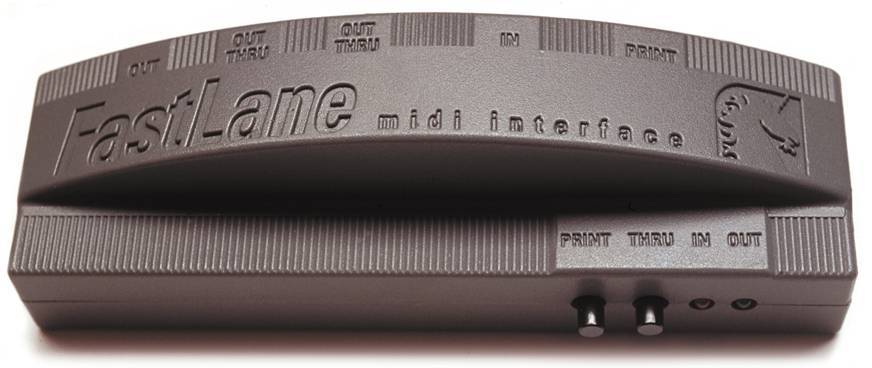 http://www.motu.com/products/midi/fastlane
http://www.motu.com/products/midi/fastlaneebay search:
http://www.ebay.com/sch/i.html?_odkw=fastlane&_osacat=0&_from=R40&_trksid=p2045573.m570.l1313.TR10.TRC2.A0.Xfastlane+midi&_nkw=fastlane+midi&_sacat=0- FastLane's "MIDI split" feature can split an incoming signal to two outputs.
- No power supply or batteries required!
- Includes serial cable.
Motu Midi Time Piece I (1990)
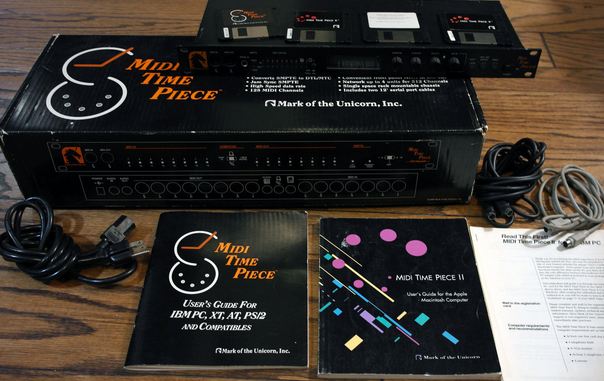

 http://cid-6f2ce1aec0191d74.skydrive.live.com/browse.aspx/MOTU_MTPII
http://cid-6f2ce1aec0191d74.skydrive.live.com/browse.aspx/MOTU_MTPIIdriver:
http://web.archive.org/web/20000712142446/http://www1.motu.com/english/download/autodown/action.lasso?-database=dldb&-layout=main&-response=searchresults.html&-op=eq&product=MIDI+Timepiece&-op=eq&platform=Macintosh&-maxRecords=all&-sortfield=description&-sortorder=ascending&-searchX REQUIRES WALLWART PSU
http://www.motu.com/techsupport/technotes/document.2000-04-07.3892261088The MOTU MIDI Timepiece I, the MIDI Timepiece II and the MIDI Timepiece AV all have networking capabilities. You can network or daisy-chain (daisy chain) any two of the above interfaces for a total of 256 MIDI channels. The Express line of interface (the MIDI Express, the Micro Express and MIDI Express XT) do not have a networking feature. how to network:
http://web.archive.org/web/19991127201302/http://motu.com/english/hardware/mtpav/net.html
Motu Midi Time Piece II (1992)
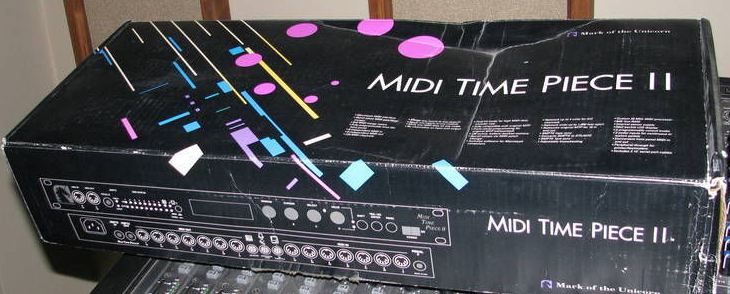


windows drivers:
http://web.archive.org/web/20000516161717/http://www1.motu.com/english/download/autodown/action.lasso?-database=dldb&-layout=main&-response=searchresults.html&-op=eq&product=MIDI+Timepiece+II&-op=eq&platform=Windows&-maxRecords=all&-sortfield=description&-sortorder=ascending&-searchpartial manual:
http://www.macos9lives.com/downloads/_img/MTP_II_ManualChapter12.pdf (using front panel controls)
http://www.macos9lives.com/downloads/_img/MTP_II_ManualChapter02.pdf (illustrates networking possibilities)
* Uses standard power lead!
The MOTU MIDI Timepiece I, the MIDI Timepiece II and the MIDI Timepiece AV all have networking capabilities. You can network or daisy-chain (daisy chain) any two of the above interfaces for a total of 256 MIDI channels. The Express line of interface (the MIDI Express, the Micro Express and MIDI Express XT) do not have a networking feature. how to network:
http://web.archive.org/web/19991127201302/http://motu.com/english/hardware/mtpav/net.html
motu midi express (1994) mac version 4in 6out 96 channels


* uses standard power lead
http://www.soundonsound.com/sos/1994_articles/mar94/motuexpress.htmlhttp://web.archive.org/web/19970113175327/http://motu.com/pages/MXP.html
Motu Pocket Express (1995?)
Pocket Express is a 2-in, 4-out, 32-channel MIDI/SMPTE interface.
midi timepiece av (1996) (original "AV" version, the
usb revision was produced later in 2000, )

 http://web.archive.org/web/19991127184611/http://motu.com/english/hardware/mtpav/mtpav.htmlhttp://web.archive.org/web/19970113172637/http://motu.com/pages/MTPAV.htmlhttp://www.sweetwater.com/sweetcare/articles/motu-parallel-midi-interface-work-windows-xp-updated-1/http://www.soundonsound.com/sos/1997_articles/jan97/motumtpav.html
http://web.archive.org/web/19991127184611/http://motu.com/english/hardware/mtpav/mtpav.htmlhttp://web.archive.org/web/19970113172637/http://motu.com/pages/MTPAV.htmlhttp://www.sweetwater.com/sweetcare/articles/motu-parallel-midi-interface-work-windows-xp-updated-1/http://www.soundonsound.com/sos/1997_articles/jan97/motumtpav.html* uses standard power lead
ebay search:
http://www.ebay.co.uk/sch/?_nkw=midi%20timepiece%20av&clk_rvr_id=556590854922&mfe=searchThe MIDI Time Piece AV provides eight discrete MIDI cables (in and out) for your computer. This allows you to use 128 independent MIDI channels. To expand beyond this, you can network up to four MTPs for a total of 512 MIDI channels. You can even connect two computers to an MTP AV network.how to network:
http://web.archive.org/web/19991127201302/http://motu.com/english/hardware/mtpav/net.htmlNETWORKING
For those of you with larger MIDI rigs, the MTP AV's Network serial port can be used to connect a second MTP AV to provide connections 9-16, or even to link up to a standard 16-channel MIDI interface. It can also serve as a second connection to the Macintosh, although this is not normally necessary with most applications which can use the multi-port capabilities of the unit. This capability is provided for compatibility with software which does not support the multi-port MTP standard.
It's actually possible to connect up to four MTP devices to your Mac, using two on each serial port -- modem and printer. In this case, there would be a free Mac port on each box providing connections 9-16, as the pairs of MTPs are connected using the network socket. You could use these to hook up a second Mac, which would then have equal access to the complete MIDI system. You can even connect both a Macintosh and a PC to the MTP AV at the same time, connecting the PC to the parallel port and the Mac to the network port; with this setup, the computers can even send data to each other.
Motu Micro Express (1996?) (original serial/parallel version)
 Motu Midi Express XT
Motu Midi Express XT (1996) (not to be confused with the orange midi express mac, midi express pc, from 1994)


* uses standard power lead
driver:
http://web.archive.org/web/20000304022057/http://www1.motu.com/english/download/autodown/action.lasso?-database=dldb&-layout=main&-response=searchresults.html&-op=eq&product=MIDI+Express+XT&-op=eq&platform=Macintosh&-maxRecords=all&-sortfield=description&-sortorder=ascending&-search
opcode Studio 3 (1992)
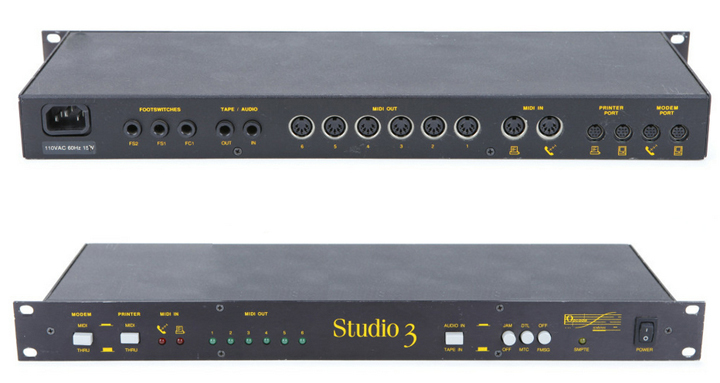
2 ports, 2 In, 6 Out
Each MIDI Out is assignable to either the printer or the modem port
reads and writes SMPTE and sends MIDI Time Code(MTC) to the Mac for synchronization.
* uses standard power lead

the studio 3 can be connected to a studio 4 or studio 5 interface (or any other opcode interface that features A/B pairs of ports on the back.
opcode Studio 4 (1992-1998?) 8x8 MIDI Interface w/SMPTE I/O


8 ports, 8 In, 10 Out
http://archive.cassiel.com/space/Gearhead/Opcode+Studio+4http://archive.org/stream/OpcodeStudio4/studio_4_manual_djvu.txtX REQUIRES WALLWART PSU requires 9vdc @ 1500ma(1.5a) or 2000ma (2a)
manual:
www.houseofsynth.com/hos-downloads/manuals/Opcode/Opcode-Studio-4-Manual-1995.pdfread&writes SMPTE all formats incl. 29.97 non-drop
when using a Mac, (OMS) has extended functionality including:
filtering, channelization, note range splitting, controller mapping, velocity and control value modification, and other processing.
8 MIDI INs/OUTs 128 MIDI Channels
**Networkable / Daisy chainable - Up to four Studio 4s can be used together for 512 MIDI channels**
2 Peripheral Thru Switches
2 pairs of MIDI INs/OUTs on front panel
Full MIDI Time Piece emulation

the studio 4 has lots of networking potential to expand... its A/B ports allow u to connect to an additional serial midi interface. the 1in/3out interface in the diagram above looks like it could be a motu fastlane but this is just for illustration purposes, literally any other serial midi interface can be connected in this way. visit this link to learn more:
http://macos9lives.com/smforum/index.php?topic=473.0
opcode Studio 5 (1992)
15 ports, 15 In, 15 Out
manual :
http://www.houseofsynth.com/hos-downloads/manuals/Opcode/Opcode-Studio-5-Manual-1997.pdf
Opcode Studio 5LX Multi-port MIDI Interface/Patchbay (1996)


15-in/15-out 240-channel compatibility | MIDI interface with synchronization and patchbay
* uses standard power lead
**Networkable / Daisy chainable up to 6 Studio 5LXs together for 1440 MIDI channels
http://web.archive.org/web/19990428221402/http://www.opcode.com/products/machardware/studio5.htmlhttp://www.soundonsound.com/sos/1996_articles/oct96/opcode5lxpt1.htmlhttp://www.soundonsound.com/sos/1996_articles/nov96/opcodestudio5lx2.html- Fifteen independently addressable
MIDI inputs and outputs—this allows
access to 240 separate MIDI channels
with programs that support either
OMS or Mark of the Unicorn’s MIDI
Time Piece™ - OMS Studio Patches support—the
Studio 5 has a built-in 16MHz 68000
microprocessor for processing Studio
Patches. Studio Patches allow MIDI
data to be split, transposed, modified
and mapped in many useful ways - Storage for up to 128 OMS Studio
Patches—the Studio 5 has 256K of
RAM for storing Studio Patches - Networking—connect up to six
Studio 5’s for 1,440 separate MIDI
channels - Standard (1MHz) and Fast communi-
cation speeds - Emulates either a standard MIDI
interface or a MIDI Time Piece - A pair of MIDI activity indicators for
each MIDI port; - Patch number display and program
change buttons - Front panel MIDI/Thru switches—
these let you use external peripherals
(such as printers or modems) without
changing cables - Two assignable footswitch inputs and
a foot controller input
Opcode studio 64x (1997)

 http://web.archive.org/web/19980212074626/http://www.opcode.com/products/cross_plat_hardware/studio64x.html
http://web.archive.org/web/19980212074626/http://www.opcode.com/products/cross_plat_hardware/studio64x.htmlwindows drivers:
http://harryaxten.webs.com/opcodestudio64x.htm pc drivers:
http://web.archive.org/web/19980212062017/http://www.opcode.com/downloads/pc_hardware/manual:
http://harrypagerubbish.webs.com/studio64x/Studio64xManual.pdfhttp://www.soundonsound.com/sos/1997_articles/may97/opcode64x.htmlwin xp driver:
http://members.driverguide.com/driver/detail.php?driverid=121455X REQUIRES WALLWART PSU
possible to make a 1->3 merge by wiring 1BOut to 2in & using 1A+2A+2B to control 3 units from 1Ain
Opcode studio 64xtc (1998)

 http://web.archive.org/web/19980212060207/http://www.opcode.com/products/cross_plat_hardware/64xtc/
http://web.archive.org/web/19980212060207/http://www.opcode.com/products/cross_plat_hardware/64xtc/pc driveR:
http://web.archive.org/web/19980212062017/http://www.opcode.com/downloads/pc_hardware/connects via serial | 4 in 4 out (the 2 extra outputs for the first 2 ports, allow this box to send the same midi notes to 2 devices (1 source, 2 destination) this is usefull for layering synths or possibly layering drums if using a GM kit.
http://www.popeye-x.com/tech/review_of_opcode_studio_64_xtc.htmhttp://web.archive.org/web/19980212060207/http://www.opcode.com/products/cross_plat_hardware/64xtc/http://www.soundonsound.com/sos/apr98/articles/studio64xtc.htmlmanual:
http://www.audioschematics.dk/downloads/manuals/midi/Studio64XTC_Manual.pdfre: network port featured on the 64xtc (and not the 64x)This RS-422 serial port lets the Studio 64 XTC network to an Opcode
Studio 4, thereby allowing both interfaces to share the same computer port
Opcode studio 128X (1998)

 http://web.archive.org/web/19980624093713/http://www.opcode.com/products/cross_plat_hardware/studio128x/
http://web.archive.org/web/19980624093713/http://www.opcode.com/products/cross_plat_hardware/studio128x/
X REQUIRES WALLWART PSU
Opcode-Studio-128x features smtpe i/o rs422 mac, thru, 8x8
http://web.archive.org/web/19980624093713/http://www.opcode.com/products/cross_plat_hardware/studio128x/http://www.soundonsound.com/sos/sep98/articles/opcode.htmlmanual:
http://www.scribd.com/doc/60805228/Opcode-Studio-128xxp driver:
http://www.gearslutz.com/board/so-much-gear-so-little-time/43986-opcode-midi-interface-xp-driver-here.html
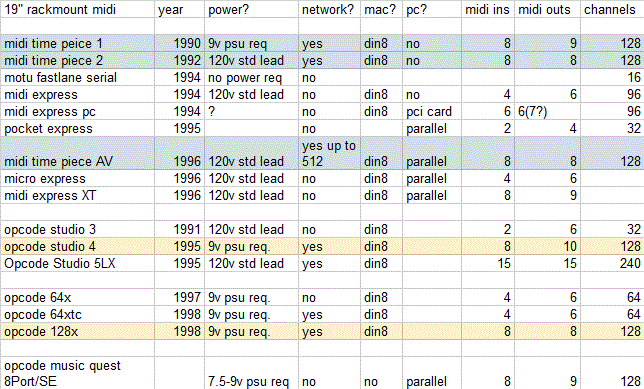
opcode translator II  http://web.archive.org/web/19980624105341/http://www.opcode.com/products/machardware/midi2.htmlhttp://www.ebay.com/itm/Midi-Translator-II-Opcode-Mac-Apple-New-Old-Stock-/370980299662
http://web.archive.org/web/19980624105341/http://www.opcode.com/products/machardware/midi2.htmlhttp://www.ebay.com/itm/Midi-Translator-II-Opcode-Mac-Apple-New-Old-Stock-/3709802996621 port, 1 In, 3 Out £58.
http://web.archive.org/web/19990427022122/http://www.opcode.com/products/machardware/midi2.html
Opcode Translator pro http://web.archive.org/web/19980212063848/http://www.opcode.com/products/machardware/transpro.html
http://web.archive.org/web/19980212063848/http://www.opcode.com/products/machardware/transpro.html
2 ports, 2 In, 6 Out £105.
http://web.archive.org/web/19990428223109/http://www.opcode.com/products/machardware/transpro.html2 ports, 2 In, 6 Out
opcode hardware:
http://web.archive.org/web/19990508143913/http://www.opcode.com/products/
 Author
Topic: MIDI Interfaces connecting via Serial (without audio i/o) (Read 92815 times)
Author
Topic: MIDI Interfaces connecting via Serial (without audio i/o) (Read 92815 times)
